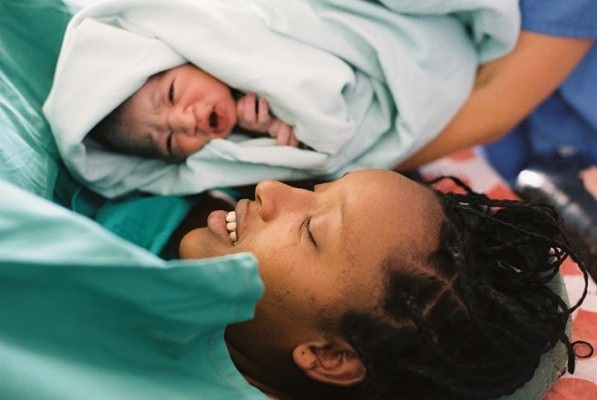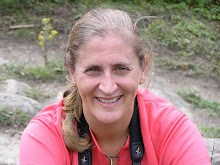February 25th
Back from my clinic trip to Muggi and am now able to appreciate what a thriving metropolis Gimbi is by comparison. Also enjoying the feeling of knowing what I am doing in clinic and of having what now feels like a large diagnostic and therapeutic armamentarium in the hospital compared to a remote clinic.
Muggi is a very small town about 40km (as the crow flies much longer by road) from the border with Sudan and about 120km from Gimbi. Unfortunately only the first 15km are asphalt road and the rest is "gravel" so the journey there takes 5 hours. The countryside on the way is stunningly beautiful with rolling hillsides, traditional thatched circular hut villages (& one refugee tarpaulin camp with migrants from Sudan) and a lot of vegetation as it is at a slightly lower altitude than Gimbi. The lower elevation also means that this is the heart of coffee growing country and the clinic was held shortly after coffee harvest meaning that the local population were feeling relatively affluent and hence potentially keen to see to lingering health needs. The nearest large town to Muggi is called Dembi Dollo and this has a small government hospital but this is still an hours drive away. There is a very large town called Gambella about three hours drive further along the road towards the Sudanese border (which is not technically open fro crossing). Gamebella & the immediate surrounding area is the only part of Ethiopia that was a protectorate of anyone, as the British managed to make a stand there. This was because there is river access in the wet season that allows boats to pass all the way through to the Mediterranean and thus it was important for coffee supply (information courtesy of my knowledgeable husband). The boats ceased going some time ago and there is now a National Park in the area unfortunately if you look at the Foreign Office website Gambella is also the only area in Ethiopia with an advisory notice not to travel there so I was happy to stay three hours away.
Muggi is one of 6 out-reach clinics that the Adventist hospital runs- each clinic has a small staff (2 nurses, a guard/caretaker, a lab technician and a cleaner). This allows local people who live very far from a hospital to have some access to basic healthcare as the clinics carry basic drugs (for example painkillers, antibiotics, TB & malaria treatment). As there are limits to the things that the nurses feel able to manage, the hospital tries to send doctors out to the clinics every few months with the trips advertised in advance so that the patients can attend for review if the wish. Unfortunately it is often difficult to find doctors to go as they are needed at the hospital so on this trip it was myself (theoretically advertised in advance as someone coming to see obstetric and gynaecology patients) and Daisy who is a very competent final year medical student from Edinburgh doing an elective in Gimbi. Daisy had an advantage over me in that she has had the opportunity to spend some time in the medical outpatients at the hospital and so knows how to manage some of the common problems found in Gimbi and the surrounding areas.
In spite of the "advertising" there were few obstetric and gynaecology patients came to clinic over the two days. This was a great disappointment to me as there must be lots of pregnant women in Muggi and the surrounding area (people travelled from significant distances to the clinic) and it seems unlikely that they are all well, low risk and experiencing no pregnancy complications! As one of the important strategies in reducing maternal mortality is to try to identify risk and recommend delivery in hospital (this would have been Dembi Dollo Government hospital rather than Gimbi) I had hoped in some small way to help- but it was not to be the case on this occasion. Instead I became a "bush" GP- I'm afraid I wimped out and declined to see men (22years of specialisation means that there are some things that are just too foreign to me now and the first man I was offered had "swollen testicle"- "to Daisy " was my response.), so I saw all the women (and children although there were remarkably few of these) and Daisy did a male clinic. Goitre (swelling of the thyroid) gland is endemic in the area due to the lack of iodine in the soil and about a third of consultations were for this problem. The remainder were a mixture of joint pains, abdominal symptoms and the occasional lump and bump. I sat with my Oxford textbook of Tropical medicine to hand but no one seemed to have TB and although I requested a few blood films for malaria all were negative. I will always wonder if I missed some other rare and fascinating tropical disease but if I did the presentation was subtle.
One good point is that the women here & especially in Muggi (it would be different in Addis) never smoke or drink. However the bad point is that many of the problems I saw are largely intractable as they are related to poor nutrition (constipation due to poor fibre, headaches due to the lack of fluid) and to the field work that women do here carrying heavy loads from dawn until dusk resulting in knee & back pain. This can also create difficulties as there is a great desire for investigations and prescriptions amongst the patients regardless of their problem and the administration of basic "life-style" advice can leave them dissatisfied with their clinic visit. One consultation exemplified this well- a 17year old came in and declared that she has swollen and painful feet. In order to examine her feet, I asked that she remove her shoes (in Ethiopia the majority of people do wear shoes usually made of single piece of moulded plastic, rather than flip-flops or going barefoot as is the case in many other poor countries). As she struggled to remove her shoes it was clear that they were not only about three sizes too small (perfect imprint of the shoe remained on her foot after removal) but they were also ridiculously pointed (like the ones I wear albeit in the correct size for reasons of female vanity for brief periods when I will not be required to walk far) and although slim she had broad feet. I naively asked whether she had other shoes fully knowing the answer without a real need for a response. I gently explained that her problems were because she had outgrown her shoes and that these were an unsuitable shape for her feet. This was translated was followed by an exchange of some length between her and the interpreter. Eventually I interrupted & enquired as to the nature of the conversation and was told, "she wanted me to prescribe something to cure her tight shoes". I tried to point out that the cost of any prescription (if I were to have an Alice in Wonderland "drink-me" solution to shrink her growing feet) would be more than the cost of going to the market and purchasing new, bigger and broader shoes.
We stayed in a small hotel opposite the clinic which was basic (and this is not English understatement) but then it only cost 20burr (£1) for the room that I shared with Daisy so it would seem unreasonable to expect more than a double bed, relative cleanliness (no roaches seen) and a plastic wash bowl with water from a canister in the communal wash cubicle (the toilet is best left without description but suffice to say I have used worse in French railway stations). Any way it was sufficient to clean up after the journey (very dusty) and for a good nights rest (braying donkey and 5am prayer call aside). We had brought sleeping bags and didn't inspect the sheets too closely but it seems unlikely the room rate included regular laundry. The room also had a bare electric light bulb and a candle but we made more use of the latter as there was only electricity for 3 hours of our 48hours in Muggi- some towns are not more atmospheric by candle light. Anyway the fact that I survived my two nights in this hotel should stop Illona (our travel agent at Steppes Travel who is arranging our trip at the end of my time in Gimbi) worrying about whether we are tough enough to cope with the two star hotels we will be staying in for some of the trip.
We returned to Gimbi (along the same beautiful but bumpy road) slightly earlier than originally planned as the initial torrent of patients dried up by lunchtime on the second day and the symptoms were becoming less serious (if you have a genuine problem you come as soon as possible on the first day) and also more bizarre (my interpreter declined to translate to me when amongst an array of other symptoms one women said "she believed that she was being nibbled by cats" suggesting instead that I might break my non-prescribing rule just to get her out of the clinic room). In total I saw 64 patient- the four O&G cases I was well qualified to deal with and thankfully on reflection I don't feel I missed anything serious or did anything too harmful to the other 60 who technically I am less qualified to deal with.
I always have had an enormous respect for GPs, as doing a good job is stressful and difficult. So my experience in Muggi has consolidated this opinion and made me absolutely certain that I made the right career choice!


No comments:
Post a Comment